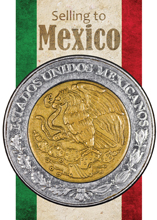Exporting to Mexico can be very lucrative, but sellers must know the ins and outs of their destination market. “You have to know how the markets in Mexico work,” Papangellin stresses, and first and foremost is “whether they are the terminal markets or retail markets.” This, he says, “is a great first step in becoming successful.”
Shippers must also be aware of foreign exchange rates, as well as which commodities are most favored in Mexico. Mexican consumers are highly discriminating about flavor and quality, says Don Goforth, marketing director at Family Tree Farms Marketing in Reedley, CA. “For years, our industry regarded [Mexico] as a secondary market, as a market that would only take our seconds, a lower grade type of product. What most people don’t understand about the Mexico market is that it is actually just the opposite,” he says.
Family Tree Farms specializes in creating differentiated genetics based solely on flavor. “We bring to market some very unique products, and interesting flavors,” Goforth explains. “To our Hispanic customers, flavor and quality of food is job one—it’s their priority.”
Arthur Miller, president of Epic Produce Sales in Phoenix, AZ agrees that knowledge is key to successfully selling into Mexico, regardless of the commodity. “The best way is to educate yourself on what items are being grown in Mexico, and what they are selling for on their domestic market.”
Take A Trip
Pear Bureau Northwest’s international marketing director, Jeff Correa, recommends research and a trip across the border. “Attending a trade show is a good way to test if there is demand for a product in Mexico.”
The USDA is a ready source of many types of information, from sales figures and shipping routes to statistics and border crossings. The Foreign Agricultural Service has plenty of “good general background on the market environment,” according to Patrick Hanemann, a principal of Farm2Market Agricultural Consulting in McAllen, TX.
He, too, encourages a visit to Mexico: “Study beforehand to see what products are moving, then go there and talk to people, using an interpreter if necessary. See what labels each buyer or importer is utilizing; get an idea of who has a good reputation, both in the market and at product origin. Above all, talk to people on the market and use the same tools to evaluate credibility and credit-worthiness as you use in the U.S. market.” He cites three major destination markets for direct export to Mexico: Mexico City, Guadalajara, and Monterrey.
On the other side of the border, John Colter-Carswell, an attorney with Colter Carswell y Asociados, S.C., in Monterrey, Mexico gives this advice: “You need to request special agricultural studies by each region. The produce industry in the northeastern part of Mexico is not the same as it is in the south.”



